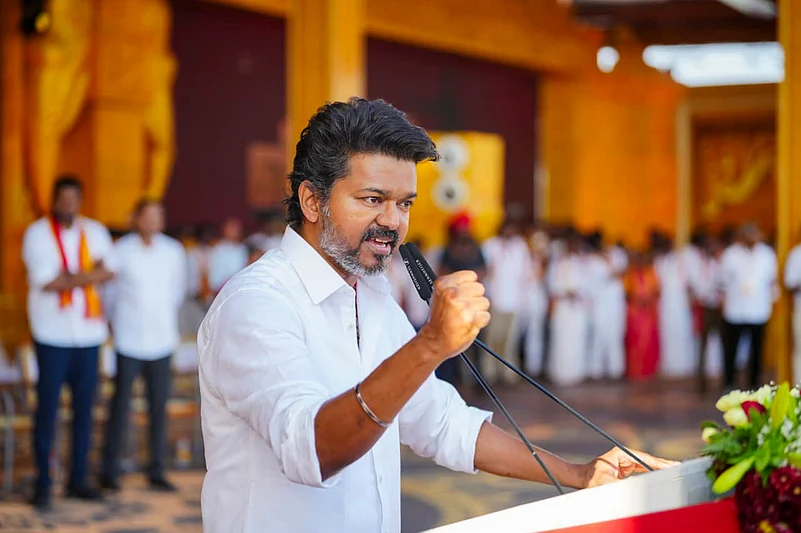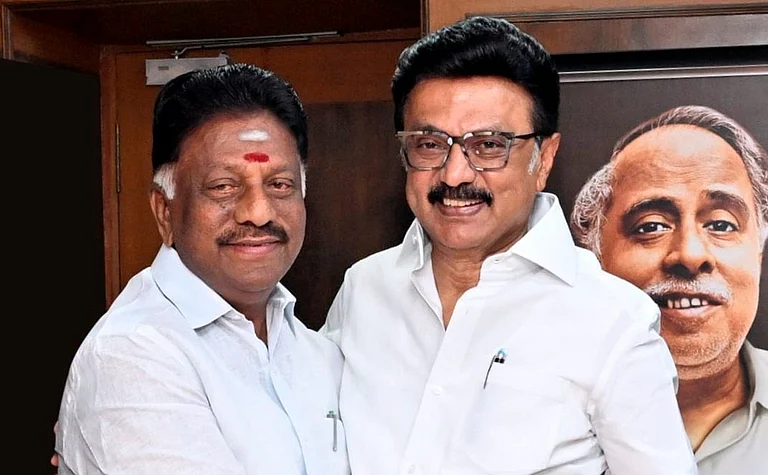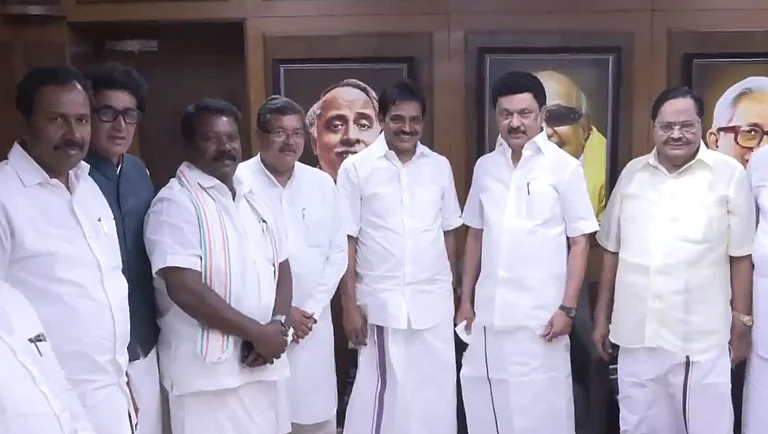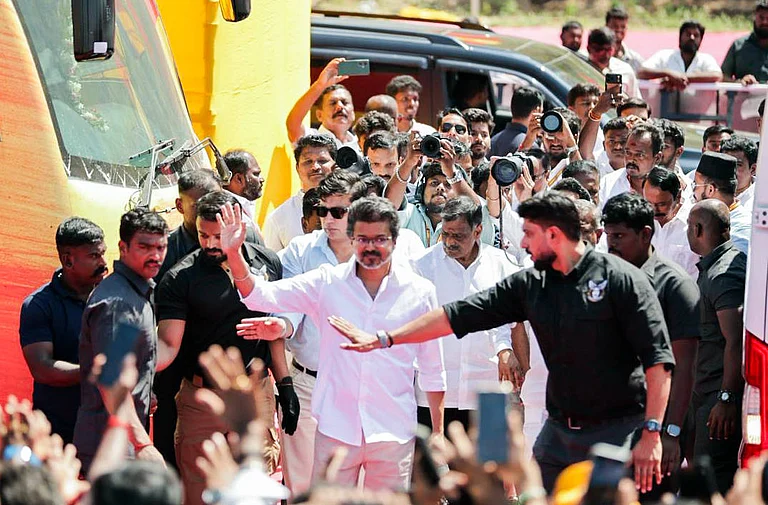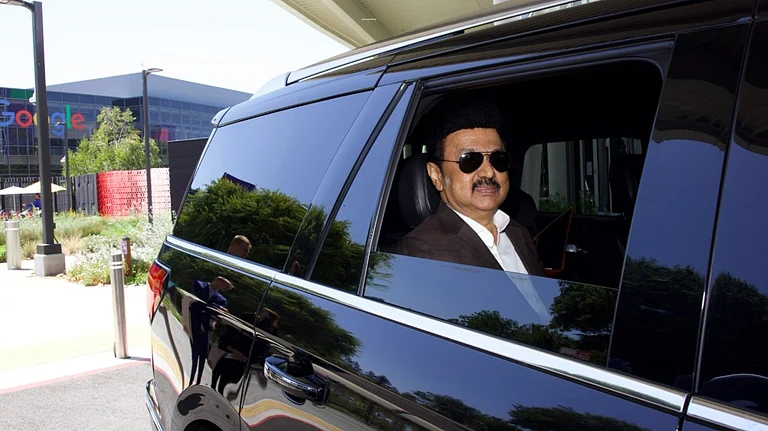
The rally showcased his mass appeal, but also highlighted his lack of ideology, political experience and clarity of vision, raising doubts about whether he can replicate MGR’s success.
Analysts warn that fan gatherings rarely translate into votes in Tamil Nadu, where grassroots organisations, caste coalitions, and ideological positioning remain decisive.
The Dravida Munnetra Kazhagam (DMK) is confident of another sweeping victory in 2026, while Vijay risks being confined on the margins unless he builds alliances and sheds the image of being merely a film star.
Madurai’s scorching August heat did little to dim the frenzy. Towering cut-outs of C. N. Annadurai, M. G. Ramachandran (MGR), and Thalapathy Vijay dominated the skyline, as lakhs of Tamilaga Vettri Kazhagam (TVK) supporters poured into the southern temple city for the party’s second state conference.
A giant digital board flashed a countdown—285 days to go for the 2026 assembly elections. The slogan “History Repeats” summed up the ambition: to project Kollywood’s superstar as the rightful heir to Tamil Nadu’s Dravidian legacy and the next MGR in the making.
“Madurai East candidate, Vijay. Madurai West candidate, Vijay. Madurai Central candidate, Vijay…” the angry young man of Tamil cinema teased the crowd before declaring that every candidate fielded by TVK would, in essence, carry his name, his face, and his brand. For a party barely a year old, Vijay is the only star, the only binding force, and the only electoral plank.
The thunderous response underscored TVK’s transformation from fan club to a political organisation. It claims 2.9 lakh office bearers, 69,400 booth agents, and a membership base already crossing 2.5 crore. A sleek Chennai war room runs round the clock with professional election managers, constituency-level surveys, and a tech-driven voter outreach app. Insiders claim TVK is racing ahead of a weakened All India Anna Dravida Munnetra Kazhagam (AIADMK) and narrowing the gap with the ruling DMK.
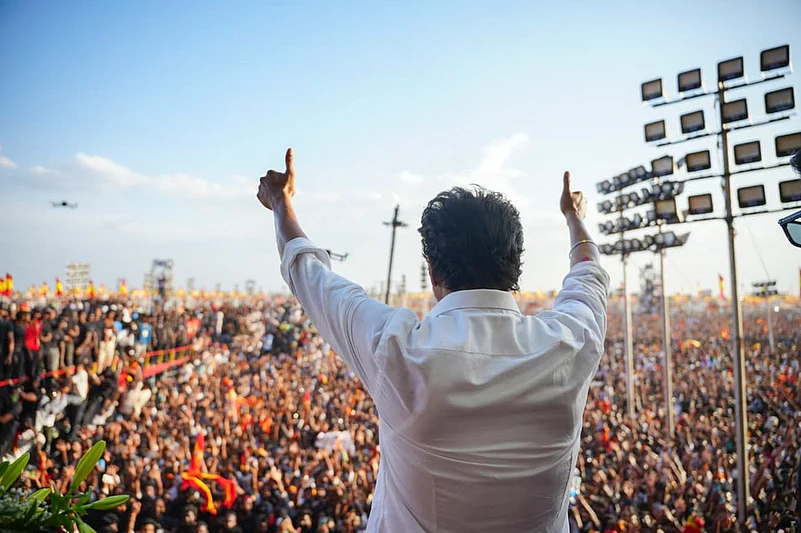
The MGR Parallel
The comparisons with MGR are deliberate. Vijay’s campaign borrows heavily from Tamil Nadu’s most beloved matinee idol-politician.
From invoking MGR’s 1977 debut—when the AIADMK swept the polls on its very first outing—to placing Annadurai and MGR cut-outs alongside his own, Vijay seeks to universalise their symbolism, arguing they belong to the Tamil people rather than to one party.
Party insiders believe the messaging resonates with a generation disillusioned by the DMK-AIADMK duopoly. Vijay is projected as “Makkal virumbum mudhalvar vetpalar”—the chief ministerial candidate people yearn for.
In Madurai, he thundered against both the DMK and the Bharatiya Janata Party (BJP)―accusing the M. K. Stalin government of corruption and collapse of law and order, while branding the BJP as his “ideological enemy”. He mocked Chief Minister M. K. Stalin as “Stalin Uncle” and dismissed the DMK’s women’s welfare schemes as tokenism. To the AIADMK, he offered no comfort either, calling its alliance with the BJP “incompatible” with MGR’s legacy and a betrayal of its “innocent cadres”.
A New Challenger
The sheer scale of TVK’s show rattled both Dravidian majors. AIADMK general secretary Edappadi K. Palaniswami (EPS) hit back, deriding Vijay as a novice who expects power without hard work. “A plant takes time to become a tree and bear fruit,” EPS quipped, contrasting Vijay’s cinematic heroism with AIADMK’s decades of toil under MGR and J. Jayalalithaa.
The DMK, meanwhile, has recalibrated its strategies, aware that Vijay could siphon off crucial youth votes and anti-incumbent sentiment.
Yet, Vijay’s rise is not merely about optics. His campaign machinery shows unusual discipline for a celebrity-led outfit. District secretaries have undergone booth-level training; a 24x7 data team tracks voter moods; and every constituency has appointed booth agents tasked with door-to-door outreach. The ambition is explicit: to replicate the MGR miracle of 1977 by winning a majority on debut.

Strengths and Shortcomings
Tamil Nadu has long blurred the line between cinema and politics. MGR and Jayalalithaa converted screen charisma into decades of political power. Vijay, with mass appeal across caste and class—especially among the youth—is perhaps the only star today capable of reviving that tradition. His on-screen persona as a crusader against corruption and protector of the poor has already laid the foundation for a political script.
Yet, the differences with MGR are stark. MGR was deeply rooted in the Dravidian movement, apprenticing for decades under Annadurai and M. Karunanidhi. His populism carried the ideological undercurrent of social justice. Vijay, in contrast, has no political apprenticeship and no clear articulated ideology beyond anti-corruption and clean governance.
His silence on pressing issues affecting Tamil Nadu raises significant concerns. He has not taken any stand on rampant caste arrogancy murders across the state, the unprecedented flow of drugs and the issue of phased or total prohibition,” notes political commentator C. Lakshmanan, who insists that Vijay is yet to develop a deep connection with subaltern Tamil Nadu.
Moreover, politics in 2026 is more complex than it was in 1977. Social media warfare, coalition compulsions, caste alliances, and a competitive party ecosystem mean charisma alone cannot deliver a landslide. Vijay is betting that superstardom plus professional political management can substitute for ideological depth and organisational tradition.
Between Disruption And Destiny
For now, Vijay insists that the 2026 battle will only be between the DMK and the TVK. He has ruled out alliances with the BJP and the AIADMK, branding them corrupt and compromised. His strategists Aadhav Arjuna and Jhon Arokiasamy claim Tamil Nadu politics is ripe for disruption, with the AIADMK weakened by 10 election losses since 2017 and the DMK weighed down by incumbency.
“But history’s weight looms large. MGR’s triumph was not only about charisma, it was also about timing, organisation, ideology, and the deep emotional connect he forged with Tamil Nadu’s masses,” observes P. K. Sreenivasan, a Chennai-based writer and political observer.
“If he can evolve from a superstar-politician into a mass leader with a coherent vision, 2026 could script history reminiscent of 1967 and 1977. If not, he risks joining the long list of actors who mistook applause for votes,” adds Sreenivasan.
Lakshmanan, a former faculty at the Madras Institute of Development Studies, too notes that invoking MGR is no accident. Every Tamil star who dabbled in politics sought to claim MGR’s mantle, the only man who seamlessly crossed from silver screen to political stage and rewrote history in 1977.
The Parachute Entry
“Vijay’s political journey is unique in one sense: he has not apprenticed in politics, unlike MGR, who honed his skills for decades within the DMK. Vijay’s lack of experience in legislative politics, ideology, and people’s movements, and his claim to leadership based solely on fan following, make his journey risky and unprecedented,” says Lakshmanan.
The Madurai conference was aimed to bridge the gap between reel life and real politics. Yet observers found his speech thin on political content. Instead of articulating a clear vision on caste, inequality, agrarian distress, or unemployment, Vijay veered into personal grievances and vague promises of clean governance.
“Everything will depend upon electoral alliances. Mass gatherings rarely convert into votes. The chances of Vijay are remote. The DMK and the AIADMK remain the major players with extensive grassroots structures and coalitions,” warns Lakshmanan.
At Madurai, Vijay was also silent on issues such as caste arrogance and the sanitation workers’ strike in Chennai, which had sparked strong emotions.
Lessons From Failure
Tamil Nadu’s political landscape is littered with the failures of cinema idols who tried to emulate MGR.
Sivaji Ganesan’s Thamizhaga Munnetra Munnani sank without a trace in 1989. Kamal Haasan’s Makkal Needhi Maiam, despite intellectual appeal, failed to win a single seat in 2021. Vijayakanth’s Desiya Murpokku Dravida Kazhagam (DMDK) briefly rose to prominence, but collapsed due to lack of depth and leadership flaws. Seeman’s Naam Tamilar Katchi remains a fringe party.
The biggest cautionary tale is Rajinikanth. If any star rivalled MGR in screen presence, it was him. His entry was awaited for decades, but in 2017, he launched a party only to withdraw before the 2021 polls. Political insiders say he realised his brand of “spiritual politics” lacked traction in Tamil Nadu’s Dravidian landscape. His retreat was a tacit admission that applause in theatres does not guarantee votes at polling booths.
Vijay risks repeating these mistakes if he fails to grasp Tamil Nadu’s political nuances.
The Vijay Persona
Vijay’s persona itself raises questions. On screen and with fans, he cultivates an image of patience, calmness, and composure. But at political rallies, including in Madurai, observers noted he appeared tense, often shouting, his speeches sounding anxious rather than confident. Whether he can sustain the relentless grind of politics―where opponents are unforgiving and alliances are fragile―remains to be seen.
The Road Ahead
For Vijay, 2026 will be an acid test. If TVK contests all 234 seats, as leaders suggest, his performance will be closely watched—not just in vote share, but whether he can break into rural bastions. Even if he fails to capture power, a respectable showing could make him a bargaining force in future alliances.
But the dream of becoming the “next MGR” remains, for now, a mirage.
“India is a democracy, and anybody can form a new party. But the real question is not about floating a party—it is about surviving the storm of Tamil Nadu politics. In 2026, who will truly emerge as the Opposition leader? Will it be EPS, Vijay, or someone from the BJP? The DMK alliance has a clear edge, grounded in ideology, grassroots structures, and a strong public mandate. We are confident of replicating another astounding victory,” says Salem Dharanidharan, the DMK’s national spokesperson.
Madurai was meant to signal Vijay’s arrival as a political force. Instead, it has exposed both the promise and the peril of star politics. Tamil Nadu once crowned an actor as chief minister, but history may not repeat without substance. Vijay, for all his cinematic aura, is still searching for a political script—and Tamil Nadu’s voters, seasoned and sceptical, may not grant him a debut as dramatic as MGR’s.







